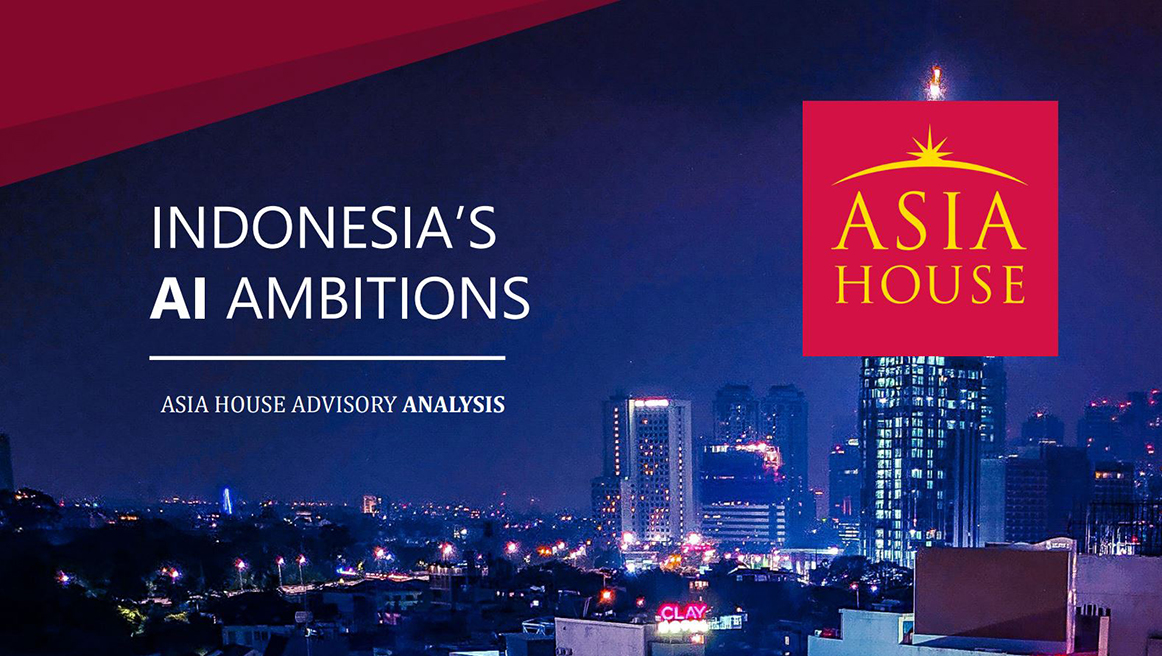Driving commercial and political engagement between Asia, the Middle East and Europe
Driving commercial and political engagement between Asia, the Middle East and Europe
Driving commercial and political engagement between Asia, the Middle East and Europe

Indonesia’s so-called ‘Omnibus Law’ – part of President Jokowi’s attempts to cut red tape and make Indonesia a more attractive destination for investors – has sparked protests across the country amid fears that the reforms undermine workers’ rights. The unrest has dominated headlines out of Jakarta, but there is another element of Jokowi’s economic strategy that has been relatively overlooked: Indonesia’s ambitions in the Artificial Intelligence (AI) space.
In July 2020, Indonesia’s Ministry of Research and Technology published a draft National AI Strategy aimed at boosting innovation and expanding Indonesia’s digital capacity into other areas of the economy. With the release of the national strategy, the government is playing catch-up to the private sector, which has been investing heavily in AI for several years. However, this is a major policy development and constitutes an attempt by the government to provide a supportive framework for AI and the tech sector in general, driven by the need to compete against global giants from the US and China, as well as regional hubs such as Singapore.
The national strategy is wide-ranging in its scope, touching multiple areas from research funding to talent acquisition. Herein lies the main challenge for a government that has struggled to coordinate multiple competing ministries. There is a compelling case for a dedicated coordinating body for Indonesia’s AI ambitions.
This Asia House Advisory note outlines what the National AI strategy could mean for Indonesia’s digital sector, the challenges facing the strategy, and recommendations for a way forward if Indonesia is to realise its AI ambitions. It also provides an overview of the current AI landscape in the country.
KEY TAKEAWAYS
– AI innovation in Indonesia’s private sector is already racing ahead, and the government is, in some respects, playing catch up. Whether the government gets a handle on the AI sector in Indonesia or not, there is significant momentum in the vibrant tech scene that deserves international attention.
– The biggest risk to the National AI Strategy lies within the political functions of the government itself. Responsibilities for delivering the strategy are spread across a wide range of ministries, and in Indonesia – where coordination between agencies has historically proved challenging – this puts the strategy’s success at risk.
– There is a case to be made for the creation of a ‘digital transformation agency’ to spearhead the national AI strategy and avoid the pitfalls of miscoordination.
Indonesia is Southeast Asia’s biggest digital economy and one of Asia’s fastest growing digital economies. It is also home to some of ASEAN’s largest tech firms, including the decacorn Go-Jek (which has a value of more than US$10bn) and four local unicorns Traveloka, Tokopedia, Bukalapak, and Ovo.
Amid the digital growth story is a burgeoning AI sector. A recent study from AT Kearney and EDBI shows that AI could add US$366 billion to Indonesia’s GDP in the next decade, or more than one-third of the Southeast Asian market. AI innovation has so far been driven primarily by the private sector, but the government has recently made a push to keep up with the launch of the draft National AI strategy.
The draft National AI Strategy, issued by the Ministry of Research and Technology, laid down five priority areas for the application of AI in the Indonesian economy: healthcare, bureaucratic reform, education and research, food security, and mobility and smart cities.
While President Jokowi’s administration has had its fair share of grand ideas, the AI strategy will complement other ongoing or recently completed legislation. The Personal Data Protection (PDP) Bill, expected to be completed by the end of 2020, will provide the ground rules for data commercialisation, while the controversial Omnibus Law (also known as the Job Creation Act), aims to draw more global AI talent to Indonesia.
The draft National AI Strategy is currently in a process of public consultation, and a broad set of representatives, from key government agencies, tech start-ups, industry associations, universities, and major industries have already been involved in the drafting process.
The document identifies several potential use cases though these are advanced applications in most cases. For example: predictive and personalised genome mapping in healthcare; chat-bots in public services, fraud detection in state budget discussion; online education content with AR/VR for the education sector; predictive analysis for food stock supply and harvesting; advanced applications for smart cities; and many more.
The Job Creation Act and the PDP will provide a good foundation for attracting investment and talent as well as creating the legal framework for a modern digital economy. But coordination will be the main challenge, and Indonesia is underequipped in this area, especially when it comes to the implementation of AI and other technology in the public sector – a key aspect of the strategy.
Responsibilities are spread across ministries which do not always work well together: the integration of public-sector data is handled by the planning ministry; e-government is handled by the ministry of bureaucratic reform; Kominfo handles internet broadband connectivity and government cloud; talent acquisition is the responsibility of many, often conflicting, agencies including Kominfo, and the ministries of industry, manpower, research and technology. It is for these reasons that local stakeholders have expressed some scepticism about the actual impact of the strategy.
The responsible ministry of research and technology does not have authority over many of the key areas identified, such as AI ethics and policy, as well as data and infrastructure. This could be less of a problem in other countries, but Indonesia suffers from a fragmented approach to policy development. Coordination of the many moving pieces need for a solid foundation for AI and the digital economy will be difficult.
A whole-of-government approach is therefore crucial for the digital transformation to take-off. Indonesia still does not have a specialised agency on digital government transformation, despite a dynamic local tech ecosystem. The active presence of big tech from both the US and China, and a vibrant digital consumer market, means there are major opportunities to be unlocked. Such an agency would be better placed to direct resources to priority sectors, some of which may otherwise be underfunded. This would also provide opportunities for international companies which may benefit from partnerships with local tech firms who are more experienced at navigating Indonesia’s complex public procurement processes.
Government playing catch up
Even without the national strategy, the Indonesian AI market is already receiving attention from global players. The size of the market and its growth potential are, as always, a major attraction. Global AI firms are partnering with Indonesia unicorns, large banks, and state-owned enterprises. Chinese and Singapore-based AI providers are particularly well-positioned. According to the Kearney-EDBI study, currently AI in Southeast Asia is mainly used for marketing and sales, followed by supply chain and manufacturing. In Indonesia, AI aspirations build on a foundation of real-life use-cases in Indonesia by local firms.
The infrastructure to support AI development has also been progressing with the entry of global cloud providers. Alicloud entered in 2018 and Google Cloud Platform in 2020, with Amazon Web Services and Microsoft Azure due to enter the market in the next year. These services will cater to the needs of more regulated sectors requiring high-tech computing power for big data and machine learning.
With more effective government support, the right institutions – specifically a dedicated digital transformation agency – and regulation, Indonesia may be able to develop an AI sector to meet its many challenges with 21st century solutions.
Report authors
 Ed Ratcliffe
Ed Ratcliffe
Head of Advisory
Asia House Advisory
 Ajisatria Suleima
Ajisatria Suleima
Advisor, Indonesia
Asia House Advisory
Published: 27 October 2020.
This analysis was produced by Asia House Advisory. For more information about the consultancy and research services provided by Asia House Advisory, please contact ed.ratcliffe@asiahouse.co.uk
To receive analysis like this directly to your inbox, subscribe to our mailing list.
